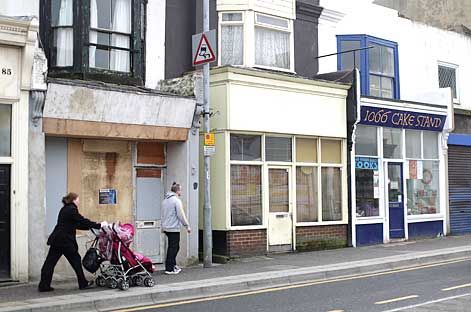Cuts to welfare payments will hit the local economies of northern towns and cities as much as five times as hard as the Conservative heartland southern counties, according to research commissioned by the Financial Times into the impact of austerity.
The government's radical reform programme, aimed at reducing one of the largest fiscal deficits among OECD nations by moving people off the benefit rolls and into work, is taking £19bn ($29 billion) a year out of working-age social security between now and 2015.
The Tories say the welfare cuts will spur the private sector to greater dynamism on the back of an expanded labour force. Three years after the policy was unveiled, the CBI employers' organisation continues to endorse it while cautioning of the risks for hard-pressed families.
But as the government considers further deep welfare cuts in the June spending round, the FT's research underlines the potential risks to economic regeneration and private sector business prospects in poorer areas where the local population faces the loss of a large slice of purchasing power.
The findings of the FT's investigation – the first to examine the local economic and business consequences of the reforms – suggest any impact will be most acute in areas outside Tory strongholds.
So great is reliance on social security in some areas that the changes, when fully implemented, will in effect eliminate 6.5 years of real household disposable income growth in Blackpool, the hardest-hit town, which on average will lose £914 a year for every working age adult. In prosperous inner London, Surrey and Buckinghamshire just a few months' worth of income growth will be lost.
The research by Christina Beatty and Steve Fothergill of Sheffield Hallam University, part-funded by the Pulitzer Center on Crisis Reporting, measured the impact of the welfare cuts from 2010 to 2014-15 on individual local authorities. Their calculations were based on the local caseload of claimants and official impact assessments of the likely losers.
The traditional industrial areas of England, Scotland and Wales, such as the Welsh Valleys, will be hard hit, particularly by tighter eligibility requirements for disability benefits. The population of Merthyr Tydfil will lose £722 a year, the same as Middlesbrough.
Inner-London areas with high rental prices are also hard hit by the restrictions on housing benefit. But the large cash cuts to those claiming welfare payments will have little effect on the London economy because social security is only a small proportion of total gross household disposable income. The welfare cuts represent 4.65 per cent of household incomes in Blackpool, but only 0.86 per cent in Surrey.
Prof Fothergill said: "A key effect of the welfare reforms will be to widen the gaps in prosperity between the best and worst local economies across Britain. Our figures also show that the Coalition government is presiding over national welfare reforms that will impact principally on individuals and communities outside its own political heartlands."
Mike Cherry, national policy chairman for the Federation of Small Businesses, said small independent shops already faced tough competition from supermarkets and out of town centres and had gone through a hard time during the recession. "Taking more money out of already struggling local economies may well exacerbate the problem," he added.
Ben Page, chief executive of Ipsos Mori, the polling company, said the heavier impact in the north would also make it harder for the Conservatives to gain the broader-based support it would need to win outright at the next general election. "Politically it just makes the Conservatives' challenge even harder," he said.
The government said: "Raising the personal allowance to £10,000 we will have lifted 2.7m people out of income tax since 2010. Our welfare reforms ... will help people back into work – which will benefit the economy more than simply abandoning them to claim benefits year after year."
Explore a data graphic on the UK's austerity cuts here.
